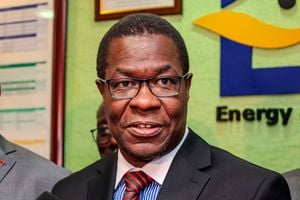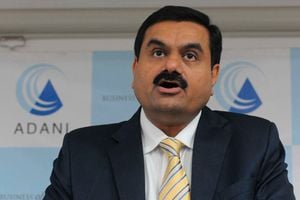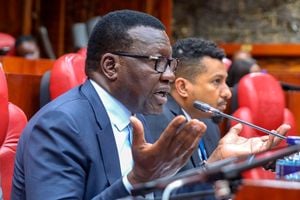
Inset: Indian billionaire Gautam Adani.
From 2020, Indian billionaire Guatam Adani and his associates allegedly offered bribes estimated at more than $265 million (Sh34 billion) to government officials in India to hand lucrative contracts to a subsidiary of Adani Group, US prosecutors allege.
Indian Energy Company bagged a manufacturing-linked solar tender floated by Solar Energy Corporation of India (Seci), which in turn was responsible for finding state electricity distribution companies that would purchase, at inflated prices, the supplied power.
One of the largest global solar energy projects for the supply of four gigawatts of solar power Seci, the deal was projected to over 20 years generate more than $2 billion (Sh259 billion) in profits after tax for the Indian billionaire who owns the conglomerate, Adani Group.
But the high energy prices contemplated under the deal made it difficult for Seci to find Indian state buyers of the power supplied by Indian Energy company and the US issuer, a renewable-energy company incorporated in Mauritius.
Without Power Sale Agreements (PSAs) to sell the energy to a state buyer, Seci could not enter into corresponding Power Purchase Agreements (PPAs) to purchase power from the Indian Energy Company’s subsidiaries.
As a result, Gautam Adani and his associates, prosecutors say, devised a further scheme to bribe Indian government officials who in turn were to coerce state electricity distribution companies to enter into PSAs with Seci.
This would then allow the Indian Energy Company’s subsidiaries and the US issuer to secure PPAs with Seci facilitating the scheme to corruptly enrich the merchants.
Extensive persuasion efforts
“During the course of the bribery scheme, the co-conspirators undertook extensive efforts to corruptly persuade government officials to cause state electricity distribution companies to execute PSAs and frequently discussed these efforts amongst themselves,” court papers state.
In furtherance of the bribery scheme, court papers add, Gautam Adani, Sagar Adani, Vneet Jaain and others “had offered and promised to Indian government officials approximately 2, 029 crore rupees (approximately $265 million in bribes in exchange for Indian government officials causing state electricity distribution companies to execute PSAs under the Manufacturing Linked Project, which would benefit the Indian Energy Company’s subsidiaries and the US issuer.”
Approximately 1, 750 crore rupees (approximately $228 million) of the corrupt payments was offered to a foreign official in exchange for the foreign official causing Andhra Pradesh’s state electricity distribution companies to agree to purchase seven gigawatt of solar power from Seci.
Following the greasing of the palms of government officials between July 2021 and February 2022, electricity distribution companies for the states and regions of Odisha, Jammu and Kashmir, Tamil Nadu, Chhattisgarh and Andhra Pradesh entered into PSAs with Seci, opening the money taps for the Adanis.
The company and its directors also relied on the US financial system to perpetuate the fraudulent scheme by, among other things, securing investors.
The Adanis and another executive at Adani Green Energy, former chief executive officer Vneet Jaain, allegedly raised more than $3 billion in loans and bonds by hiding their corruption from lenders and investors.
Now, the charging of Guatam Adani and seven associates in the US over the Sh34 billion bribery and fraud claims has brought into sharp focus the multi-billion deals the Indian billionaire is eyeing in Kenya.
One such deal, which Kenyan government has already signed with Adani, involves the Kenya Electricity Transmission Company Ketraco) to build three electricity transmission lines and two-substations, which the Indian conglomerate will operate for 30 years at a cost of Sh95.68 billion.
On Thursday, Energy Cabinet Secretary Opiyo Wandayi told MPs the Ketraco-Adani deal will go on despite the new bribery revelations, insisting at the time of award the government carried out due diligence that didn’t find anything suspicious.
However, questions have been raised that the indictment by US authorities followed a lengthy investigation that would have been uncovered if a thorough background check had been done.
President William Ruto, top officials in his administration and ODM leader Raila Odinga have defended the Adani Group, which is also angling for another Sh238 billion contract to expand the Jomo Kenyatta International Airport (JKIA).
Both deals have sparked public outrage and are the subject of numerous court cases by petitioners who have argued the government pushed through the lucrative deals in secrecy and has disregarded concerns about Adani’s controversial past.
Mr Adani and seven others, including his nephew Sagar Adani, who was the executive director of the Indian Energy Company’s board of directors, allegedly agreed to pay bribes to Indian government officials to obtain contracts expected to yield Sh259 billion of profit over 20 years and develop India’s largest solar power plant project.
Court documents stated that they allegedly conspired to misrepresent the company’s anti-bribery practices to US-based investors and international financial institutions.
They are also accused of concealing, from the same investors and institutions, their bribery of Indian government officials to obtain billions of dollars in financing for green energy projects, including solar energy supply contracts.
“As alleged, the defendants orchestrated an elaborate scheme to bribe Indian government officials to secure contracts worth billions of dollars and Gautam S. Adani, Sagar R. Adani and Vneet S.
“Jaain lied about the bribery scheme as they sought to raise capital from US and international investors,” stated Breon Peace, US Attorney for the Eastern District of New York.
“This indictment alleges schemes to pay over $250 million in bribes to Indian government officials, to lie to investors and banks to raise billions of dollars, and to obstruct justice,” stated Deputy Assistant Attorney-General Lisa Miller.
“These offenses were allegedly committed by senior executives and directors to obtain and finance massive state energy supply contracts through corruption and fraud at the expense of US investors.
“The Criminal Division will continue to aggressively prosecute corrupt, deceptive, and obstructive conduct that violates US law, no matter where in the world it occurs.”
'Knowingly and willfully'
The court documents stated that since 2020, the Indian businessman and his firms knowingly and willfully conspired to corruptly offer, authorise, and promise to pay bribes to and for the benefit of government officials in India state electricity distribution companies to enter into contracts
Investigations by FBI revealed that the co-conspirators destroyed and suppressed documents and communications and provided false information to the US government during the investigations.
The Indians allegedly used the US financial system to perpetuate the fraudulent scheme by seeking and securing investors and potential investors in the US and causing wires to be sent and received through the US.
For the five counts, the US authorities will be seeking the forfeiture of any of their properties, constituting or derived from proceeds obtained directly or indirectly as a result of the offences.
The statements filed in court stated that from 2021 through to 2024, the Indian Energy Company publicly released integrated annual reports, which included false and misleading statements regarding the company.
“For example, the 2020 through 2023 reports falsely stated that the Indian Energy company had a ‘zero tolerance’ policy for bribery and corruption, which policy was reviewed by its board of directors, when in fact defendants, Gautam S. Adani, Sagar R, Adani and Vneet S. Jaain, all of whom were members of the Indian Energy Company’s board of directors, were personally engaged in bribery Scheme,” the charges stated.
In Kenya, more than five cases have been filed to challenge the JKIA deal and another deal with Ketraco, to build three electricity transmission lines and two substations, which the Indian conglomerate will operate for 30 years at a cost of Sh95.68 billion.
An earlier deal, a 30-year concession for the development and operation of the JKIA, which was approved by the Public private Partnership Committee, was stopped by the High Court.
The cases challenging the deals have been filed by Law Society of Kenya (LSK), Katiba Institute, Kenya Human Rights Commission, activist Tony Gachoka, as well as political parties Wiper Democratic Alliance party, Jubilee Party and Democratic Action Party of Kenya (DAPK).
The case by LSK and KHRC was certified as raising serious constitutional issues and was referred to the Chief Justice Martha Koome for appointment of a bench of three judges, to determine the case.
KHRC and LSK challenged the deal arguing that JKIA is a strategic and profitable national asset and the deal is, therefore, irrational and violates the principles of good governance, accountability, transparency, and prudent and responsible use of public money.
In the latest case, Katiba Institute moved to the High Court to challenge the constitutionality of some sections of the Public Private Partnerships Act over the Adani Group deals.
The lobby group argued that the exclusion of Parliament from Public Private Partnerships (PPP) agreements violates the constitution.
The organisation further argues that some sections of the Act undermine the constitutional framework for checks and balances by excluding parliamentary approval for Privately Initiated Proposals (PIPs).
Katiba Institute further said by making discretionary the decision whether PIPs should be subjected to open competitive tendering, section 44(5) and (6) of the PPPA violate Article 227 of the constitution, hence unconstitutional.
“The handling of the JKIA deal raises substantial doubts about the capacity of any subsequent processes related to the project guaranteeing fairness under Article 227 of the constitution,” Katiba Institute said.
The organisation said in the 2024 Budget Policy Statement, the PPP directorate revealed that a total of 31 projects were in the pipeline and at various stages, with most of them as the procurement stage.
“The court needs to urgently intervene to keep conservatory orders in place to preserve Kenya’s constitutional order and to determine the primary questions on the constitutionality of the PPPA,” he said.
The organisation further said the case raises substantial questions of law that should be handled by a bench of three judges.
Katiba Institute will be asking the court to declare that the unconstitutionality of the PPP Act should apply retroactively with respect to Ketraco and JKIA projects, based on the principle that unconstitutional laws or actions are void from the beginning.
In his petition, Gachoka alongside Mount Kenya Jurist and the three political parties accuses the government of intending to hand over JKIA as a gift to Adani.
“The Kenyan Government has sought to consider handing over the existing revenue-generating assets and facilities of KAA as a gift to the 1st- 2nd respondents (Adani Group and Adani Airports Holding) at no apparent benefit to the people of Kenya, through the application of the PPP Act and other laws in a manner that is not open or accountable,” Mr Gachoka said.
In response to the petition challenging the JKIA deal, the government said the High Court lacked the powers to determine the petition as the Petition Committee has the original jurisdiction to determine disputes arising from decisions and processes under the PPP Act.
“The court lacks jurisdiction by virtue of section 75(8) of the Act as the High Court is only empowered with appellate jurisdiction on appeals from the Petition Committee and not the original jurisdiction,” the government said through MMA Advocates.











